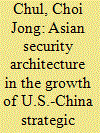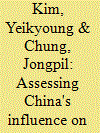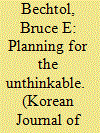|
|
|
Sort Order |
|
|
|
Items / Page
|
|
|
|
|
|
|
| Srl | Item |
| 1 |
ID:
108530


|
|
|
|
|
| Publication |
2011.
|
| Summary/Abstract |
Recognizing that the broader structure of East Asia's regional order is going to
change, this paper assumes that there are three major factors to drive and facilitate
the East Asian order: (1) An existing security architecture comprised of various
bilateral and multilateral mechanisms; (2) the role of America in adjusting the current
security multilateralism to lead to it remaining cooperative and/or competitive; and
(3) the bilateral relationship of the two powers, the United States and China.
The paper argues that East Asian order has been and will be determined by the
changing state of Sino-U.S. relations. Then it explores what relationship the United
States and China engage in and where it is directed. The next section discusses what
effect the Sino-U.S. relationship has on the security order in East Asia focusing on
the major multilateral security arrangements as seen in Figure 1. To do this, the
two distinct multilateral security mechanisms, the U.S.-Japan-Australia Trilateral
Strategic Dialogue (TSD) and the Shanghai Cooperation Organization (SCO), will be
analyzed. Additionally, as a bridge between the United States and China for security
cooperation, the Korea-China-Japan Tripartite Cooperation Dialogue (TCD) will be
explored. The future of both Sino-U.S. relations and its relations with the East Asian
security order are dealt with in the conclusion.
|
|
|
|
|
|
|
|
|
|
|
|
|
|
|
|
| 2 |
ID:
108532


|
|
|
|
|
| Publication |
2011.
|
| Summary/Abstract |
It is widely known that China's influence on Southeast Asia has been growing
rapidly since the Asian financial crisis of 1997. However, determining the true
dimensions of China's influence in this region is still controversial. It seems quite
conspicuous that the growing economic relations between China and the region
give China more bargaining power, due to the expanding role of the bilateral trade
and China's foreign aid in promoting the regional economic growth. However,
this does not give us a clear picture of how China has been able to exercise its
influence on the behavior of the states in the region for its own interests. Therefore,
this paper tries to assess China's influence on Southeast Asia by analyzing the
specific case of Taiwan. Recently, China's rising influence has significantly
affected Southeast Asia's relations with Taiwan. Southeast Asian states are paying
more attention to the cross-Strait relations when considering attempting to improve
relations with Taiwan. This research defines "influence" as the capability of state
A to affect the behavior of state B, either directly or indirectly, to comply with state
A's policy interests. If the diplomatic behavior of state B changes accordingly
due to the action, then it can be said that state A has illustrated its influence over
state B. By studying the Taiwan issue, this paper reveals that China has been
quite successful in exercising its influence on Southeast Asian states to comply
with China's policy toward Taiwan.
|
|
|
|
|
|
|
|
|
|
|
|
|
|
|
|
| 3 |
ID:
108537


|
|
|
|
|
| Publication |
2011.
|
| Summary/Abstract |
As the United States and South Korea expressed solidarity in blaming North
Korea for its attack on the South Korean warship Cheonan, followed by North
Korea's artillery attack on Yeonpyeong Island, and in imposing further sanctions
on North Korea, global attention is now focused on China with regard to whether
it will cooperate in imposing punitive measures on its ally. Despite the worsening
cleavages between China and North Korea since October 2006 when the latter
tested its nuclear weapons, this study shows that their relations have remained
robust in the economic context although they are experiencing a political transition. This paper begins with Sino-DPRK relations by exploring the status of the
alliance in transition in the political and military context. Further, it considers the
economic context between the two nations by reviewing Chinese aid to North
Korea and North Korea's trade data, using the "flow of goods" as a proxy for
"flow of money." Then, this paper applies North Korea's strategic interaction
with the United States in the game-theoretic methods in order to illustrate the
Chinese impact on the effectiveness of economic sanctions on North Korea. The
study found that China's role remains consequential, as the strategies of North
Korea and the United States depend on China's position.
|
|
|
|
|
|
|
|
|
|
|
|
|
|
|
|
| 4 |
ID:
108534


|
|
|
|
|
| Publication |
2011.
|
| Summary/Abstract |
For the past 15 years, the concept of human security has been promoted as a significant extension of traditional security studies. However, while human security
has been present and visible in academic and practitioner discourse, it is yet truly
to capture the imagination of specialists. Partly this is a result of the belligerent
direction global politics has taken in the new millennium. Partly, however, it results
from conceptual inadequacies internal to the notion itself. This article confronts
the latter problem. It first examines the emergence of human security within the
wider security studies literature, homes in on debates about human security, and
draws important parallels between development and human security. It then
builds on this to restate human security as freedom from fear and freedom from
want, and to demonstrate how this conceptualization can be understood as a dual
responsibility initially to protect and subsequently to provide. It finally considers
whether a responsibility to intervene is generated by this approach. The brief conclusion summarizes the argument that this conceptualization generates a fresh
way forward for human security studies.
|
|
|
|
|
|
|
|
|
|
|
|
|
|
|
|
| 5 |
ID:
108528


|
|
|
|
|
| Publication |
2011.
|
| Summary/Abstract |
North Korea has shown no willingness to give up its nuclear weaponization programs. In fact, Pyongyang has gone out of its way to keep essential elements of its
nuclear programs hidden unless it was in the DPRK's interest to publicly display
them. With the increase in tensions initiated by North Korea in recent years this is
particularly disturbing. A review of North Korea's nuclear weapons capabilities
reveals a two-track agenda consisting of both a plutonium (proven) and a highly
enriched uranium (likely) program. Scenarios involving both of these programs
show that North Korea-despite rather primitive capabilities-can deliver a nuclear
weapon that would cause casualties in the tens of thousands. While a preemptive
strike may seem like the obvious answer to a nuclear attack, North Korea's ability
to strike back with non-nuclear forces would likely mean a full-scale conflict possibly involving hundreds of thousands of casualties. Consequence management
for a nuclear attack would be unable to prevent second- and third-order effects
that could last as long as a generation. High-level officials in Washington and
Seoul have placed renewed focus on planning for nuclear scenarios on the Korean
peninsula-but the bottom line is that preventing and deterring a North Korean
nuclear attack must be a high priority.
|
|
|
|
|
|
|
|
|
|
|
|
|
|
|
|
| 6 |
ID:
108535


|
|
|
|
|
| Publication |
2011.
|
| Summary/Abstract |
After the end of the Cold War, Japan became very active in its security policy. How
can we explain this phenomenon? This essay argues that (neo-) realist settings
(the end of the Cold War, the Taepodong missile launch) have triggered changes
in Japanese domestic security culture, which subsequently affected Japanese
security policy. In spite of rationalist theorists' criticism of the constructivist
approach for not being able to clarify independent and dependent variables, this
essay attempts to elucidate the relationship between security culture and policies
thereof. By utilizing "cultural process-tracing," this paper investigates how cultural
elements become linked and internalized into policymaker-level and illustrates
the causal relationship between these two.
|
|
|
|
|
|
|
|
|
|
|
|
|
|
|
|
| 7 |
ID:
108538


|
|
|
|
|
| Publication |
2011.
|
| Summary/Abstract |
The size and resources at the disposal of the Shanghai Cooperation Organization
(SCO) give the institution inherent geopolitical potential. Combined, the organization's
full members and observers encompass much of the world's habitable landmass
and almost half its population. The SCO governments engage in a number of mutual
security activities. For example, regular meetings occur among the defense ministers,
armed forces chiefs, general staffs, and border commanders of the SCO governments.
Contacts are even more common among mid-level military officers, especially
those in charge of border security units and military units in nearby SCO territories.
Military experts from SCO countries also engage in regular direct discussions related
to their functions. In addition, for several years SCO members have undertaken
numerous joint initiatives to combat narcotics trafficking and organized crime.
Increasingly, these are directed at establishing a security "belt" around Afghanistan,
which is seen as the source of most of the region's narco-trafficking. Still, the most
important SCO military activities are its major security exercises, which have
become quite extensive in recent years. Yet, the failure of the organization to have
much of an impact on Afghanistan and especially Kyrgyzstan-which after all is
a SCO member-raises doubts about its developing security role in Asia.
|
|
|
|
|
|
|
|
|
|
|
|
|
|
|
|
| 8 |
ID:
108529


|
|
|
|
|
| Publication |
2011.
|
| Summary/Abstract |
The article argues that North Korean society is designed in a way which makes it
quite immune to pressure and incentives which originate externally. The only
force which in the long run has the capacity to place the North Korean leaders
under sufficient pressure is the North Korean people (and the Cold War experience
demonstrated that such pressure might be decisive). Due to the peculiar situation
of the divided nation and the exceptional success of the South, the North Korean
regime is especially vulnerable to the spread of truthful and uncensored information
about the outside world. So, a low-profile, determined and prolonged information
dissemination campaign is necessary. The North Korean populace should be made
aware of the prosperity of South Korea. The nationalist pretensions of the Kim
regime should be rebuffed. The North Koreans should also be frankly informed
of the less attractive features of the modern world as well. While radio broadcasts
remain the major media for delivering the message, the spread of new digital
technologies creates new opportunities which should be seriously exploited as
well, including video documentaries and electronic books.
|
|
|
|
|
|
|
|
|
|
|
|
|
|
|
|
|
|
|
|
|